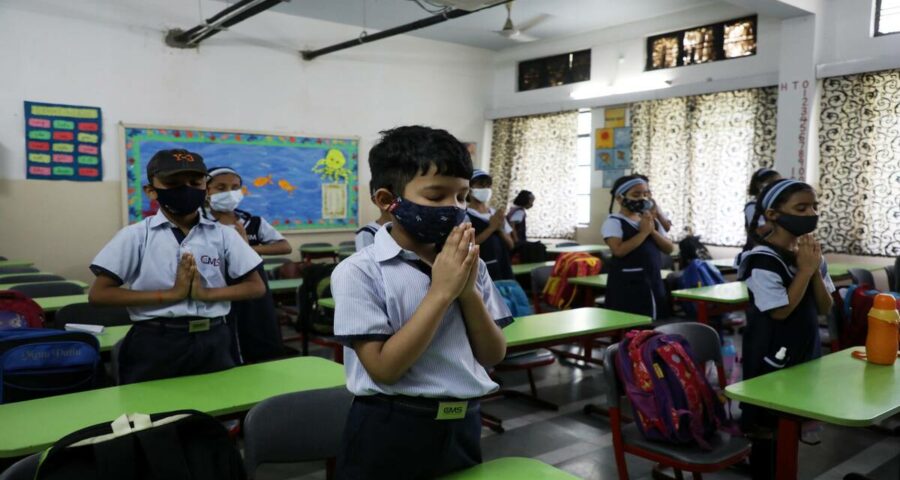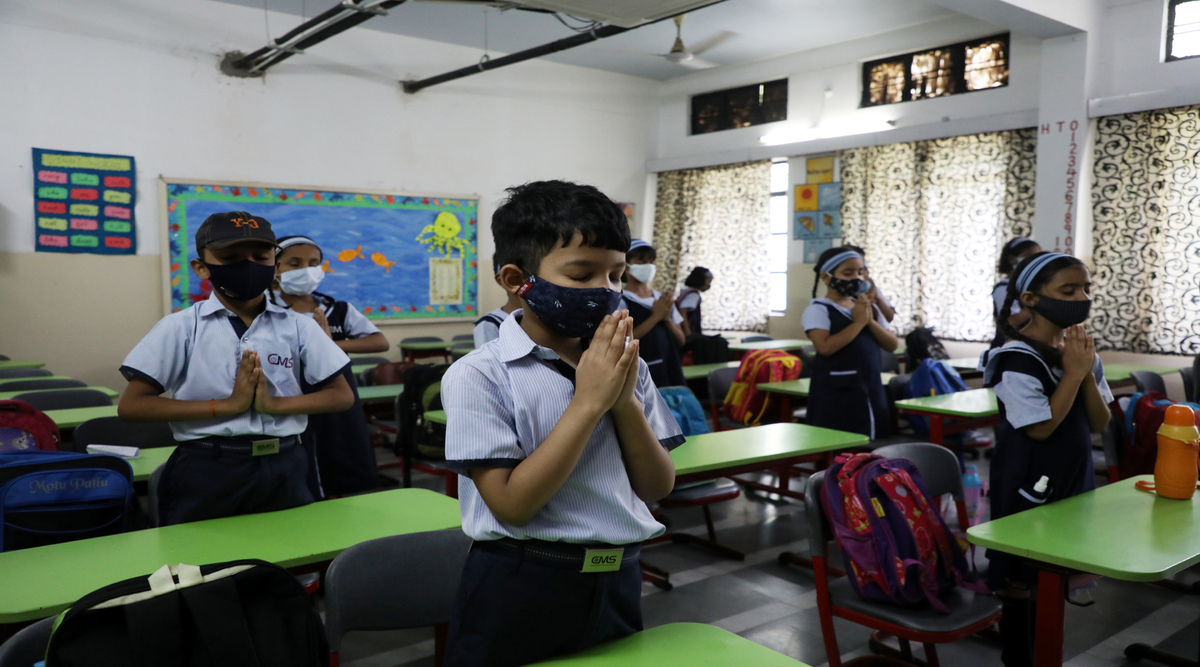According to UNICEF’s research, a substantial proportion of students and their parents reported that students learnt significantly less compared to pre-pandemic levels. In India, 80 per cent of children aged 14-18 years reported lower levels of learning than when physically at school.
In its recently released report, the Parliamentary Standing Committee on Education recommended several measures to bridge the learning gap in a post pandemic world. Among the recommendations are: extra classes, curtailment of vacations, assigning expert teachers for personalised coaching, parental engagement, peer-group and collaborative learning.
While the learning gap is one of the pressing concerns, there are various other factors that have hampered the growth of a student. While some lost a parent, many others lost interest in the online learning medium. Many parents also complain about the increased screen time affecting their children’s mental well-being. With schools reopening, these institutions now have diverse areas to work on for overall development of a child.
Learning takes hit in the pandemic year
As per a recent field study conducted by Azim Premji Foundation, ‘the approach to teaching and learning will need to respond not just to the curriculum change but also to the socio-emotional issues of students’.
Talking to indianexpress.com, Dr Shalini Advani, Director, Pathways School Noida said that students’ mental health and well-being are some of the important factors. “To cater to the socio-emotional needs of students, we have a team of counsellors who visit the classrooms to monitor the activities of the students. Lessons on mindfulness and emotional well-being are also being given to the students,” Advani said.
Meanwhile, Khaitan Public School, Ghaziabad is concentrating more on training teachers to be the counsellors. The school reopened its campus for classes 9 to 11 from September and will be resuming offline classes for classes 6 to 8 from October 1.
“We enrolled the teachers under the Social, Emotional, and Ethical (SEE) learning course offered by Emury University and Dalai Lama. The course provides educators with the tools they need to foster the development of emotional, social, and ethical intelligence for students and themselves,” Anirudh Khaitan, Vice Chairman, Khaitan Public School, Ghaziabad said.
Deepak Garg, a resident of Gurugram, lost his wife during the second wave of Covid-19. Deepak said that it is painstakingly hard to understand what is happening inside his 7-year-old daughter’s mind.
“Once a talkative child, she doesn’t utter more than a few words anymore. Her performance in online classes has also declined. Although the teachers and schools have been extremely supportive through the phase, I am worried about how she will cope up in the classroom,” Garg said.
There are many other families, where a child has lost either of his/her parents and now is reluctant to enter any space alone.
‘No need to set time table’
Lycée Français International de Delhi is focusing on prioritising students’ mental health in the initial days of school reopening. The French school has divided its strategy as per the age group of children.
“For kindergarten students, our focus is to make them familiar with the school environment, enhance their social skills and not focus on academics for the first few weeks. Initially, these kids are not bound by school timings and are allowed to leave with their parents when they feel comfortable. Once all the kids adapt to the classroom environment, a set timetable will be created,” explained Martial Bey, primary school headmaster, International French School of Delhi.
Meanwhile, for elementary classes, the school is focusing on children’s adaptability towards classroom learning. “These children are coming to school after a gap of more than one year. We are encouraging group activities following distance norms,” Bey said.
Suchitra Academy International School, Hyderabad reopened its campus for students with a plan to conduct academic activities outdoors or in different venues instead of restricting students to the classrooms.
“We have introduced a partnering programme where a teacher connects with about 12 children every week with different modules like ‘knowing yourself’. Counsellors have been talking to children in general and then specific sessions on different topics have been scheduled. We see a sudden loss of purpose and fear of offline examination,” KV Praveen Raju, founder, Suchitra Academy International School told indianexpress.com.
While many schools are implementing the socio-emotional aspect in curriculum now, Seth Anand Ram Jaipuria School, Kanpur had taken up the steps a year ago.
“We had witnessed the changes in student’s learning and behaviour patterns in the initial months of the online learning. Hence, we upgraded our curriculum by including four major aspects — self-awareness, self-management, environmental awareness and strategic decision making. Talk sessions were also arranged for one-to-one interaction with students,” Shikha Banerjee, principal, Seth AnandRam Jaipuria School, Kanpur said.
Train teachers to fill learning gap
While socio-emotional support is one aspect of post-covid teaching, another pressing concern is the learning gap created due to online education.
According to a UNICEF’s research, a substantial proportion of students and their parents reported that students learned significantly less compared to pre-pandemic levels. In India, 80 per cent of children aged 14-18 years reported lower levels of learning than when physically at school.
“The safe reopening of schools must be considered an utmost priority for all governments. Parallelly, investing in teachers will ensure that teachers and schools can adapt to all situations. The more teachers are trained, equipped, and supported on distance and blended learning, the better they will be able to reach all their students,” the study mentioned.
Gunjan Mehta, mother of a nine-year-old from Surat, said that her son who was among the top-performing students in his class, is now finding it difficult to match his previous performance in online mode. “For children like my son, who are interactive and attention seekers and need appreciation for working hard, online classes proved to be a difficult option. My son’s interest in studies has severely declined. To bridge this learning gap, I have to give him extra time. I hope school reopening will help improve his performance,” Mehta said.
Jaipuria School Kanpur addressed the learning gap issue by conducting surveys and online polls with students. Based on it, three groups of students were identified — in group 1, children are at pace with the curriculum and willing to learn; group 2 students are good at academics but unwilling to learn; and group 3 students are willing to learn but are not at par with the curriculum.
“These groups are identified but students are not informed about this segregation. These students are provided worksheets, learning curriculum based on their current understanding level. The goal is to bridge the learning gap created by the end of the session,” the school principal explained.
However, experts suggest that the parents should not worry about the learning loss of their children, especially in the primary classes. “The foundation years of a child are crucial yet the grasping power of the kids is at the highest. The kids will easily bridge the gap created due to online learning once offline classes resume,” Khaitan Public School vice-chairman said.
Parents apprehensive to send wards to schools
Meanwhile, many parents are reluctant to send their kids to schools skeptical about the safety of their children.
“My daughter is very keen to go back to school but we are scared since the third wave of Covid-19 is predictive. Moreover, there are no vaccine provisions available for kids yet. We will not be sending her to school for another month or so,” Shama Tripathi, a parent from Kanpur said.
Suchitra Academy founder, Praveen Raju said that at this point in time, the first effort for schools is to make parents understand that it is extremely important to send children to school. Blended learning is creating a further gap.
“Once most children are in school, the first thing we are ready with is diagnostic assessments. Understanding each child’s needs and clear specific target-oriented path has to be chalked out where parents’ involvement will be crucial. The most important thing to happen for children to bridge this gap would be to make them feel confident and happy, only then they will be able to work hard,” he said.
Source: Read Full Article


